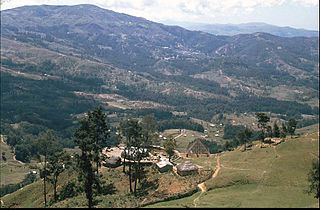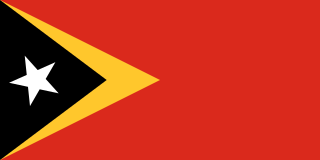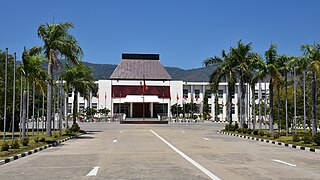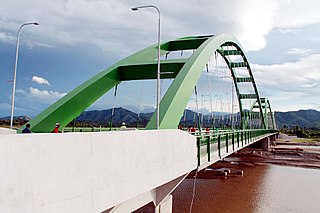
Luanda is the capital and largest city of Angola. It is Angola's primary port, and its major industrial, cultural and urban centre. Located on Angola's northern Atlantic coast, Luanda is Angola's administrative centre, its chief seaport, and also the capital of the Luanda Province. Luanda and its metropolitan area is the most populous Portuguese-speaking capital city in the world and the most populous Lusophone city outside Brazil. In 2020 the population reached more than 8.3 million inhabitants.

Dili is the capital and largest city of East Timor. It lies on the northern coast of the island of Timor, in a small area of flat land hemmed in by mountains. The climate is tropical, with distinct wet and dry seasons. The city has served as the economic hub and chief port of what is now East Timor since its designation as the capital of Portuguese Timor in 1769. It also serves as the capital of the Dili Municipality, which includes some rural subdivisions in addition to the urban ones that make up the city itself. Dili's growing population is relatively youthful, being mostly of working age. The local language is Tetum; however, residents include many internal migrants from other areas of the country.

The political system in Timor-Leste is a unitary semi-presidential representative democratic republic, whereby the Prime Minister of Timor-Leste is the head of government and the President of Timor-Leste functions as head of state. Timor-Leste has a multi-party system. Executive power is exercised by the president and the government. Legislative power is vested in both the government and the National Parliament. The Judiciary is independent of the executive and the legislature. The East Timorese constitution was modelled on that of Portugal, with lesser power given to the president. The country is still in the process of building its administration and governmental institutions. The Economist Intelligence Unit rated East Timor a "flawed democracy" in 2022.

The economy of Timor-Leste is a low-income economy as ranked by the World Bank. It is placed 140th on the Human Development Index, indicating a medium level of human development. 20% of the population is unemployed, and 52.9% live on less than $1.25 a day. About half of the population is illiterate. At 27%, Timor-Leste's urbanisation rate is one of the lowest in the world.

The Timor Leste Defence Force is the military of East Timor. The F-FDTL was established in February 2001 and comprises two infantry battalions, small naval and air components and several supporting units.
The culture of Timor-Leste reflects numerous cultural influences, including Portuguese, Roman Catholic, and Malay, on the indigenous Austronesian cultures in Timor-Leste.

East Timor is divided into 14 municipalities, which are former districts. One municipality is also a Special Administrative Region (SAR). The municipalities are divided into administrative posts, and further subdivided into sucos (villages). Atauro Island was initially a part of Dili Municipality, but became a separate municipality on 1 January 2022. The borders between Cova Lima and Ainaro and between Baucau and Viqueque were changed in 2003.

The languages of Timor-Leste include both Austronesian and Papuan languages. The lingua franca and national language of Timor-Leste is Tetum, an Austronesian language influenced by Portuguese, with which it has equal status as an official language. The language of the Oecusse exclave is Uab Meto (Dawan). Fataluku is a Papuan language widely used in the eastern part of the country. A dialect of Malay-based creole called Dili Malay is spoken by a number of residents in the capital Dili, it borrowed words mostly from Portuguese and Tetum. Both Portuguese and Tetum have official recognition under the Constitution of Timor-Leste, as do other indigenous languages, including: Bekais, Bunak, Galoli, Habun, Idalaka, Kawaimina, Kemak, Lovaia, Makalero, Makasae, Mambai, Tokodede and Wetarese.

Manufahi is one of the municipalities of East Timor. It has a population of 53,691 and an area of 1,323 km2. The capital of the municipality is Same.

The Catholic Church in Timor-Leste is part of the worldwide Catholic Church, under the spiritual leadership of the pope in Rome.

The Roman Catholic Archdiocese of Díli is an archdiocese located in the city of Díli in Timor-Leste.

Timor-Leste, also known as East Timor, officially the Democratic Republic of Timor-Leste, is a country in Southeast Asia. It comprises the eastern half of the island of Timor, the coastal exclave of Oecusse in the island's northwest, and the minor islands of Atauro and Jaco. Australia is the country's southern neighbour, separated by the Timor Sea. The country's size is 14,950 square kilometres (5,770 sq mi). Dili, on the north coast of Timor, is its capital and largest city.

Oecusse, also known as Oecusse-Ambeno and formerly just Ambeno, officially the Special Administrative Region Oecusse-Ambeno, is an exclave, municipality and the only special administrative region (SAR) of East Timor.

The Palácio de Lahane, also known as the Palácio das Nobres, is a historic building in East Timor. As of 2022, its primary function was as a reception space for the East Timorese government.

The Nicolau Lobato Presidential Palace is the official workplace of the President of the Democratic Republic of Timor-Leste. It is located in Avenida Presidente Nicolau Lobato, Bairro Pite, a suco of Dili, the capital city of East Timor, and has been the workplace of the President since 2009.

The Noefefan Bridge is a two-lane road bridge over the Tono River in the suco of Lifau, a village in Oecusse, the East Timorese exclave on the north western coast of Timor. As of 2017, when the bridge was inaugurated, it was the largest bridge ever built in East Timor. It connects several isolated communities west of the river with Pante Macassar to its east.
The first lady of East Timor is the title attributed to the wife of the president of Timor-Leste.

The CPLP Bridge is a pair of two-lane road bridges in the suco of Comoro, a western suburb of Dili, capital city of East Timor.















